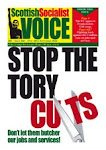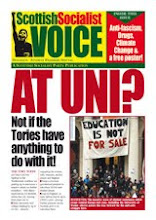Jimmy Reid’s Glasgow University rectorial address delivered on 28th April 1972 (aka as his ‘Rat Race’ speech)
Jimmy Reid
From Wikipedia, the free encyclopedia
"Jimmy Reid (9 July 1932 – 10 August 2010) was a Scottish trade union activist and journalist born in Govan, Glasgow. His leadership of the Upper Clyde Shipbuilders Work-in attracted international recognition. He served as Rector of the University of Glasgow and subsequently became a journalist and broadcaster."
‘Alienation is the precise and correctly applied word for describing the major social problem in Britain today. People feel alienated by society. In some intellectual circles it is treated almost as a new phenomenon. It has, however, been with us for years. What I believe is true is that today it is more widespread, more pervasive than ever before. Let me right at the outset define what I mean by alienation. It is the cry of men who feel themselves the victims of blind economic forces beyond their control. It’s the frustration of ordinary people excluded from the processes of decision making. The feeling of despair and hopelessness that pervades people who feel with justification that they have no real say in shaping or determining their own destinies.
Many may not have rationalised it. May not even understand, may not be able to articulate it. But they feel it. It therefore conditions and colours their social attitudes. Alienation expresses itself in different ways by different people. It is to be found in what our courts often describe as the criminal anti-social behaviour of a section of the community. It is expressed by those young people who want to opt out of society, by drop outs, the so-called maladjusted, those who seek to escape permanently from the reality of society through intoxicants and narcotics. Of course it would be wrong to say it was the sole reason for these things. But it is a much greater factor in all of them than is generally recognised.
Society and its prevailing sense of values leads to another form of alienation. It alienates some from humanity. It partially dehumanises some people, makes them insensitive, ruthless in their handling of fellow human beings, self-centred and grasping. The irony is, they are often considered normal and well adjusted. It is my sincere contention that anyone who can be totally adjusted to our society is in greater need of psychiatric analysis and treatment than anyone else.
They remind me of the character in the novel, Catch 22, the father of Major Major. He was a farmer in the American Mid West. He hated suggestions for things like medi-care, social services, unemployment benefits or civil rights. He was, however, an enthusiast for the agricultural policies that paid farmers for not bringing their fields under cultivation. From the money he got for not growing alfalfa he bought more land in order not to grow alfalfa. He became rich. Pilgrims came from all over the state to sit at his feet and learn how to be a successful non-grower of alfalfa. His philosophy was simple. The poor didn’t work hard enough and so they were poor. He believed that the good Lord gave him two strong hands to grab as much as he could for himself. He is a comic figure. But think, have you not met his like here in Britain? Here in Scotland? I have.
It is easy and tempting to hate such people. However it is wrong. They are as much products of society and a consequence of that society, human alienation, as the poor drop out. They are losers. They have lost essential elements of our common humanity. Man is a social being. Real fulfilment for any person lies in service to his fellow men and women.
The big challenge to our civilisation is not OZ, a magazine I haven’t even seen let alone read. Nor is it permissiveness, although I agree our society is too permissive. Any society which, for example, permits over one million people to be unemployed is far too permissive for my liking. Nor is it moral laxity in the narrow sense that this word is generally employed – although in a sense here we come nearer to the problem. It does involve morality, ethics, and our concept of human values. The challenge we face is that of rooting out anything and everything that distorts and devalues human relations. Let me give two examples from contemporary experience to illustrate the point.
Recently on television I saw an advert. The scene is a banquet. A gentleman is on his feet proposing a toast. His speech is full of phrases like “this full-bodied specimen”. Sitting beside him is a young, buxom woman. The image she projects is not pompous but foolish. She is visibly preening herself, believing that she is the object of this bloke’s eulogy. Then he concludes – “and now I give ...” then a brand name of what used to be described as Empire sherry. The woman is shattered, hurt and embarrassed. Then the laughter. Derisive and cruel laughter. The real point, of course, is this. In this charade, the viewers were obviously expected to identify not with the victim but with her tormentors.
The other illustration is the widespread, implicit acceptance of the concept and term, the rat race. The picture it conjures up is one where we are scurrying around scrambling for position, trampling on others, back-stabbing, all in pursuit of personal success. Even genuinely intended friendly advice can sometimes take the form of someone saying to you, “Listen, you look after number one”. Or as they say in London, “Bang the bell, Jack, I’m on the bus”.
‘To the students I address this appeal. Reject these attitudes. Reject the values and false morality that underlie these attitudes. A rat race is for rats. We’re not rats. We’re human beings. Reject the insidious pressures in society that would blunt your critical faculties to all that is happening around you, that would caution silence in the face of injustice lest you jeopardise your chances of promotion and self-advancement. This is how it starts and before you know where you are, you’re a fully paid-up member of the rat-pack. The price is too high. It entails the loss of your dignity and human spirit. Or as Christ put it, “What doth it profit a man if he gain the whole world and suffer the loss of his soul?”
Profit is the sole criterion used by the establishment to evaluate economic activity. From the rat race to lame ducks. The vocabulary in vogue is a giveaway. It’s more reminiscent of a human menagerie than human society. The power structures that have inevitably emerged from this approach threaten and undermine our hard-won democratic rights. The whole process is towards the centralisation and concentration of power in fewer and fewer hands. The facts are there for all who want to see. Giant monopoly companies and consortia dominate almost every branch of our economy. The men who wield effective control within these giants exercise a power over their fellow men which is frightening and is a negation of democracy.
Government by the people for the people becomes meaningless unless it includes major economic decision making by the people for the people. This is not simply an economic matter. In essence it is an ethical and moral question for whoever takes the important economic decisions in society ipso facto determines the social priorities of that society.
From the Olympian heights of an executive suite, in an atmosphere where your success is judged by the extent to which you can maximise profits, the overwhelming tendency must be to see people as units of production, as indices in your accountants’ books.
To appreciate fully the inhumanity of this situation, you have to see the hurt and despair in the eyes of a man suddenly told he is redundant without provision made for suitable alternative employment, with the prospect in the west of Scotland, if he is in his late forties or fifties, of spending the rest of his life in the Labour Exchange. Someone, somewhere has decided he is unwanted, unneeded, and is to be thrown on the industrial scrap heap. From the very depth of my being, I challenge the right of any man or any group of men, in business or in government, to tell a fellow human being that he or she is expendable.
The concentration of power in the economic field is matched by the centralisation of decision making in the political institutions of society. The power of Parliament has undoubtedly been eroded over past decades with more and more authority being invested in the Executive. The power of local authorities has been and is being systematically undermined. The only justification I can see for local government is as a counterbalance to the centralised character of national government.
Local government is to be restructured. What an opportunity, one would think, for decentralising as much power as possible back to local communities. Instead the proposals are for centralising local government. It’s once again a blueprint for bureaucracy, not democracy. If these proposals are implemented, in a few years when asked “Where do you come from?”, I can reply: “The Western Region”. It even sounds like a hospital board.
‘It stretches from Oban to Girvan and eastwards to include most of Glasgow conurbation. As in other matters, I must ask the politicians who favour these proposals – where and how in your calculations did you quantify the value of a community? Or a community life? Of a sense of belonging? Of the feeling of identification? These are rhetorical questions. I know the answer. Such human considerations do not feature in their thought processes.
Everything that is proposed from the establishment seems almost calculated to minimise the role of the people, to miniaturise man. I can understand how attractive this prospect must be to those at the top. Those of us who refuse to be pawns in their power game can be picked up by their bureaucratic tweezers and dropped in a filing cabinet under “M” for malcontent or maladjusted. When you think of some of the high flats around us, it can hardly be an accident that they are as near as one could get to an architectural representation of a filing cabinet.
If modern technology requires greater and larger productive units, let’s make our wealth producing resources and potential subject to public control and to social accountability. Let’s gear our society to social need, not personal greed. Given such creative re-orientation of society, there is no doubt in my mind that in a few years we could eradicate in our country the scourge of poverty, the underprivileged, slums, and insecurity.
Even this is not enough. To measure social progress purely by material advance is not enough. Our aim must be the enrichment of the whole quality of life. It requires a social and cultural, or if you wish, a spiritual transformation of our country. A necessary part of this must be the restructuring of the institutions of government and where necessary, the evolution of additional structures so as to involve the people in the decision making processes of our society. The so-called experts will tell you that this would be cumbersome or marginally inefficient. I am prepared to sacrifice a margin of efficiency for the value of the people’s participation. Anyway, in the longer term, I reject this argument.
To unleash the latent potential of our people requires that we give them responsibility. The untapped resources of the North Sea are as nothing compared to the untapped resources of our people. I am convinced that the great mass of our people go through life without even a glimmer of what they could have contributed to their fellow human beings. This is a personal tragedy. It’s a social crime. The flowering of each individual’s personality and talents is the pre-condition for everyone’s development.
In this context education has a vital role to play. If automation and technology is accompanied as it must be with full employment, then the leisure time available to man will be enormously increased. If that is so, then our whole concept of education must change. The whole object must be to equip and educate people for life, not solely for work or a profession. The creative use of leisure, in communion with, and in service to our fellow human beings can and must become an important element in self-fulfilment.
‘Universities must be in the forefront of development, must meet social needs and not lag behind them. It is my earnest desire that this great University of Glasgow should be in the vanguard initiating changes and setting the example for others to follow. Part of our educational process must be the involvement of all sections of the university on the governing bodies. The case for student representation is unanswerable. It is inevitable.
My conclusion is to reaffirm what I hope and certainly intend to be the spirit permeating this address. It’s an affirmation of faith in humanity. All that is good in man’s heritage involves recognition of our common humanity, an unashamed acknowledgement that man is good by nature. Burns expressed it in a poem that technically was not his best, yet captured the spirit.
In “Why should we idly waste our prime,” he writes:
“The golden age, we’ll then revive, each man shall be a brother,
In harmony we all shall live and till the earth together,
In virtue trained, enlightened youth shall move each fellow creature,
And time shall surely prove the truth that man is good by nature”.
It’s my belief that all the factors to make a practical reality of such a world are maturing now. I would like to think that our generation took mankind some way along the road towards this goal. It’s a goal worth fighting for.









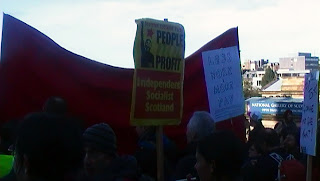
















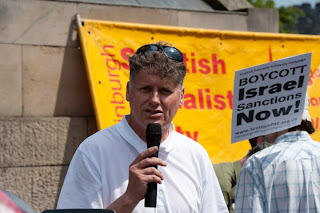













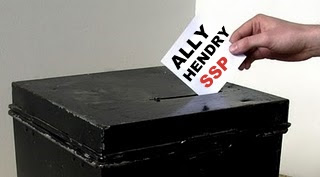








.jpg)
